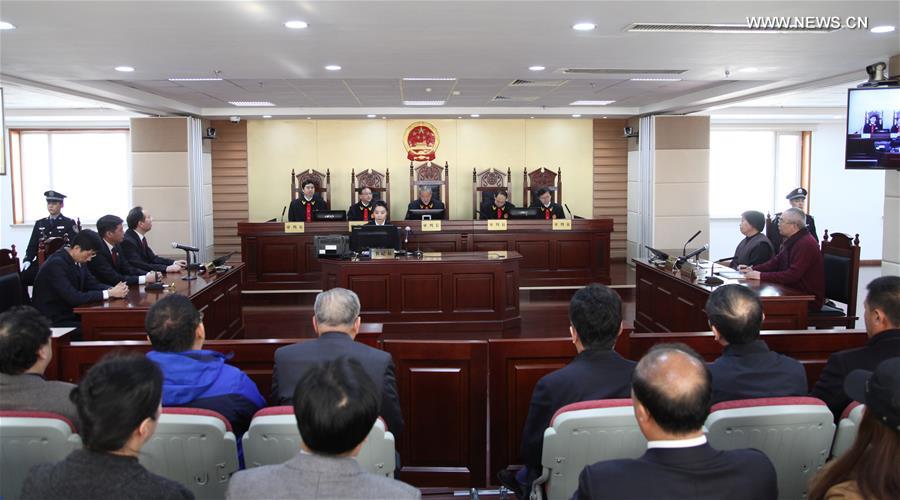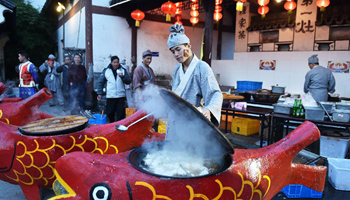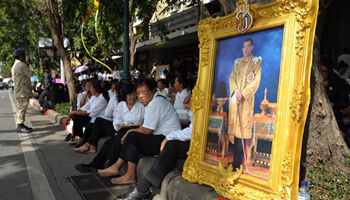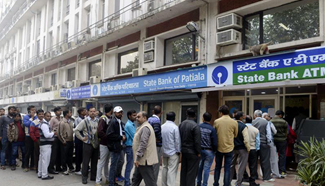
Photo taken on Dec. 2, 2016 shows the scene of the trial. A man convicted for rape and murder in China had his conviction overturned by China's top court on Friday, 21 years after he was executed. The second circuit court under the Supreme People's Court revoked the verdict, ruling that the previous conviction was based on insufficient evidence and unclear facts. Nie Shubin was convicted in 1995 of raping and murdering a woman on the outskirts of Hebei provincial capital, Shijiazhuang, and executed the same year at the age of 21. (Xinhua)
SHENYANG, Dec. 2 (Xinhua) -- A man convicted for rape and murder in China had his conviction overturned by China's top court on Friday, 21 years after he was executed.
The second circuit court under the Supreme People's Court revoked the verdict, ruling that the previous conviction was based on insufficient evidence and unclear facts.
Nie Shubin was convicted in 1995 of raping and murdering a woman on the outskirts of Hebei provincial capital, Shijiazhuang, and executed the same year at the age of 21.
The case reemerged in 2005 when another man Wang Shujin admitted his guilt and said Nie was innocent. Wang, 49, was given the death sentence in unconnected rape and murder cases.
In December 2014, the Supreme People's Court assigned the higher court of Shandong Province to review the case, which found there were too many questions about the previous trial to uphold the conviction.
The Supreme People's Court decided to retry the case in June 2016. The retrial panel of the Supreme People's Court second circuit court reviewed all documents in the case, visited the crime scene, verified evidence and questioned former personnel who had handled the case. It also heard opinions from the Supreme People's Procuratorate, which insisted that the evidence presented in the original trial was insufficient and the verdict should be changed.
The Supreme People's Court finally announced Nie's innocence on Friday. It ruled that evidence was lacking; the tools used to commit the crime could not be confirmed; the time and cause of death could not be confirmed; several key documents, including some records of the questioning of Nie and witnesses, had been lost; and that the truth and legitimacy of Nie's confession were questionable.
The evidence used to convict Nie was not accurate or sufficient and did not meet the requirements for a conviction, it said.
A number of wrongful convictions have been publicized in the past years, raising concerns over miscarriages of justice.
Another such conviction was that of an 18-year-old man named Huugjilt who was found guilty of rape and murder by an Inner Mongolian court in 1996. He was executed the same year.
Almost a decade later, serial rapist and killer Zhao Zhihong admitted to the murder when arrested in 2005. Huugjilt was acquitted in December 2014, and his family were given state compensation.
In February this year, an eastern Chinese court announced that it had quashed the conviction of a man named Chen Man, who was sentenced to death with reprieve about 21 years ago. Chen, who had been in a lengthy appeals process, was immediately released after the announcement.
A court hearing was not held for Nie's case as he was already executed, but it would not affect the impartial handling of the case, the Supreme People's Court said in a statement obtained by Xinhua.
Overturning Nie's conviction is of "major historical and realistic significance," the statement said.
It is an implementation of rule of law and a demonstration of social progress and judicial justice, showing that China attaches great importance to human rights.
It is also an important achievement in improving the judicial system and preventing cases being wrongly judged, which will have a positive impact on public credibility, the statement said.
Nie and his family were finally given justice, it said. Judicial staff must remember this painful lesson and ensure such a tragedy does not repeat itself and that justice never comes so late.
The Supreme People's Court asked all judicial organs to better protect the legitimate rights of criminal suspects and defendants, and safeguard human rights throughout the litigation process.
They must handle cases according to legal procedure, and are banned from trapping suspects to make confessions or forcing them to confess by torture, the statement said.
Verdicts must be based on objective and legitimate evidence validated through cross-examination, as well as authentic and legitimate confessions, so that all convictions are "beyond doubt."
The investigating, prosecuting and judicial bodies should coordinate with each other while checking each other, the Supreme People's Court said.
Authorities should be bold and ensure they admit to and correct wrong decisions in a timely manner, it said.
The Supreme People's Court has told Nie's mother Zhang Huanzhi that she has the right to apply for state compensation, and that authorities will provide assistance in her application if she needs.
"Thanks to everyone who made efforts in Nie Shubin's case," a microblog account identified on Sina Weibo as Nie's mother Zhang Huanzhi posted on Friday morning.











